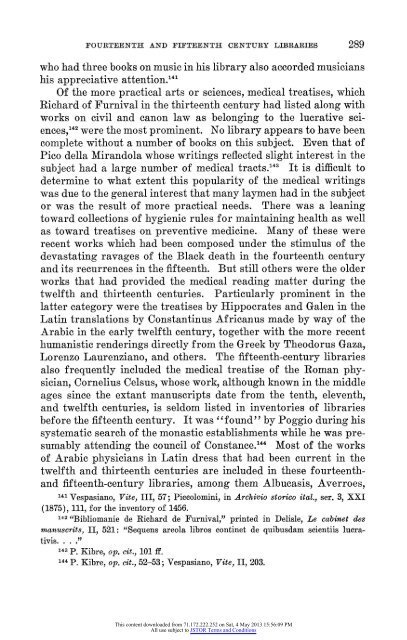The Intellectual Interests Reflected in Libraries of the Fourteenth and ...
The Intellectual Interests Reflected in Libraries of the Fourteenth and ...
The Intellectual Interests Reflected in Libraries of the Fourteenth and ...
You also want an ePaper? Increase the reach of your titles
YUMPU automatically turns print PDFs into web optimized ePapers that Google loves.
FOURTEENTH AND FIFTEENTH CENTURY LBRARIES 289<br />
who had three books on music <strong>in</strong> his library also accorded musicians<br />
his appreciative attention.'4'<br />
Of <strong>the</strong> more practical arts or sciences, medical treatises, which<br />
Richard <strong>of</strong> Furnival <strong>in</strong> <strong>the</strong> thirteenth century had listed along with<br />
works on civil <strong>and</strong> canon law as belong<strong>in</strong>g to <strong>the</strong> lucrative sciences,'42<br />
were <strong>the</strong> most prom<strong>in</strong>ent. No library appears to have been<br />
complete without a number <strong>of</strong> books on this subject. Even that <strong>of</strong><br />
Pico della Mir<strong>and</strong>ola whose writ<strong>in</strong>gs reflected slight <strong>in</strong>terest <strong>in</strong> <strong>the</strong><br />
subject had a large number <strong>of</strong> medical tracts.143 It is difficult to<br />
determ<strong>in</strong>e to what extent this popularity <strong>of</strong> <strong>the</strong> medical writ<strong>in</strong>gs<br />
was due to <strong>the</strong> general <strong>in</strong>terest that many laymen had <strong>in</strong> <strong>the</strong> subject<br />
or was <strong>the</strong> result <strong>of</strong> more practical needs. <strong>The</strong>re was a lean<strong>in</strong>g<br />
toward collections <strong>of</strong> hygienic rules for ma<strong>in</strong>ta<strong>in</strong><strong>in</strong>g health as well<br />
as toward treatises on preventive medic<strong>in</strong>e. Many <strong>of</strong> <strong>the</strong>se were<br />
recent works which had been composed under <strong>the</strong> stimulus <strong>of</strong> <strong>the</strong><br />
devastat<strong>in</strong>g ravages <strong>of</strong> <strong>the</strong> Black death <strong>in</strong> <strong>the</strong> fourteenth century<br />
<strong>and</strong> its recurrences <strong>in</strong> <strong>the</strong> fifteenth. But still o<strong>the</strong>rs were <strong>the</strong> older<br />
works that had provided <strong>the</strong> medical read<strong>in</strong>g matter dur<strong>in</strong>g <strong>the</strong><br />
twelfth <strong>and</strong> thirteenth centuries. Particularly prom<strong>in</strong>ent <strong>in</strong> <strong>the</strong><br />
latter category were <strong>the</strong> treatises by Hippocrates <strong>and</strong> Galen <strong>in</strong> <strong>the</strong><br />
Lat<strong>in</strong> translations by Constant<strong>in</strong>us Africanus made by way <strong>of</strong> <strong>the</strong><br />
Arabic <strong>in</strong> <strong>the</strong> early twelfth century, toge<strong>the</strong>r with <strong>the</strong> more recent<br />
humanistic render<strong>in</strong>gs directly from <strong>the</strong> Greek by <strong>The</strong>odorus Gaza,<br />
Lorenzo Laurenziano, <strong>and</strong> o<strong>the</strong>rs. <strong>The</strong> fifteenth-century libraries<br />
also frequently <strong>in</strong>cluded <strong>the</strong> medical treatise <strong>of</strong> <strong>the</strong> Roman physician,<br />
Cornelius Celsus, whose work, although known <strong>in</strong> <strong>the</strong> middle<br />
ages s<strong>in</strong>ce <strong>the</strong> extant manuscripts date from <strong>the</strong> tenth, eleventh,<br />
<strong>and</strong> twelfth centuries, is seldom listed <strong>in</strong> <strong>in</strong>ventories <strong>of</strong> libraries<br />
before <strong>the</strong> fifteenth century. It was "found" by Poggio dur<strong>in</strong>g his<br />
systematic search <strong>of</strong> <strong>the</strong> monastic establishments while he was presumably<br />
attend<strong>in</strong>g <strong>the</strong> council <strong>of</strong> Constance.'44 Most <strong>of</strong> <strong>the</strong> works<br />
<strong>of</strong> Arabic physicians <strong>in</strong> Lat<strong>in</strong> dress that had been current <strong>in</strong> <strong>the</strong><br />
twelfth <strong>and</strong> thirteenth centuries are <strong>in</strong>cluded <strong>in</strong> <strong>the</strong>se fourteenth<strong>and</strong><br />
fifteenth-century libraries, among <strong>the</strong>m Albucasis, Averroes,<br />
141 Vespasiano, Vite, III, 57; Piccolom<strong>in</strong>i, <strong>in</strong> Archivio storico ital., ser. 3, XXI<br />
(1875), 111, for <strong>the</strong> <strong>in</strong>ventory <strong>of</strong> 1456.<br />
142 "Bibliomanie de Richard de Furnival," pr<strong>in</strong>ted <strong>in</strong> Delisle, Le cab<strong>in</strong>et des<br />
manuscrits, II, 521: "Sequens areola libros cont<strong>in</strong>et de quibusdam scientiis luerativis.<br />
. .."<br />
143 P. Kibre, op. cit., 10 i<br />
144 P. Kibre, op. cit., 52-53; Vespasiano, Vite, II, 203.<br />
This content downloaded from 71.172.222.252 on Sat, 4 May 2013 15:56:09 PM<br />
All use subject to JSTOR Terms <strong>and</strong> Conditions

















